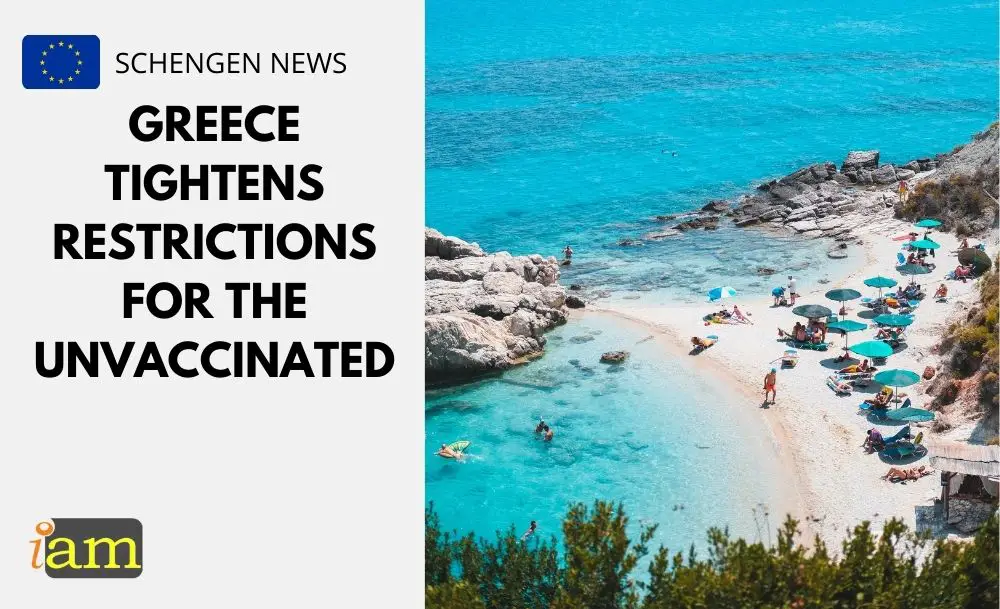Greece Tightens Restrictions for the Unvaccinated


Greece, one of Europe’s top destinations for travellers around the world, has announced new restrictions that will affect unvaccinated citizens and foreign nationals looking to holiday in Greece and those seeking employment.
Greece relies heavily on the income generated by its usually booming tourist trade. Greece was one of the first major travel destinations to ease its entry requirements for all travellers, as the country was keen to bring its tourism sector back to life. However, the new restrictions suggest a more cautious approach in the wake of increasing cases.
From 13 September until 31 March 2022, all private and public sector workers without a certificate proving vaccination or recovery from COVID-19 within the last six months will have to undergo one rapid test per week, Health Minister Vassilis Kililias said.
Two tests per week will be required for people working in academia, tourism, restaurants, cafes, bars, and in entertainment productions, as well as school and university students, he added.
Changes Under New Rules


Under the new restriction changes, unvaccinated individuals will only be able to enter indoor cinemas, theatres, museums, archaeological sites and gyms if they have proof of a negative rapid test taken within the last 48 hours.
On top of this, venues will also have the ability to refuse access to unvaccinated patrons if they wish to do so. This could leave unvaccinated travellers with little to do in Greece.
Travellers who head to Greece for seasonal work will also be affected by other new restrictions. All unvaccinated public and private sector employees will have to undergo weekly tests at their own expense. Those who are unvaccinated and work in tourism, restaurants, cafes and bars will be subjected to twice-weekly tests at a cost of €10 each, with tests paid for by the employee.
Masks will be mandatory for everyone in indoor public areas and in outdoor crowded areas.
Vaccines Recognised in Greece
Greece accepts a wide range of vaccines including:
- Pfizer,
- Moderna,
- AstraZeneca,
- Novavax,
- Johnson & Johnson,
- Sinovac,
- Sputnik,
- Cansino Biologics and
- Sinopharm
To be considered fully vaccinated, at least 14 days must have passed since your last recommended dose.
Travellers visiting Greece who have an EU Digital COVID Certificate can use that to enter venues. If you're coming from a country outside the EU, in theory, you should be able to present your printed or electronic vaccination certificate.
All certificates must be issued by a public health authority and must include all relevant information such as your name, number of doses, dates, type of vaccine etc. Vaccine certificates must be presented in either Greek, English, German, French, Italian, Spanish or Russian.
Do you have plans to travel to Greece? Talk to us in the comment section below.
Check out the deals we have found below and tell us your travel plans.
Check out the offers and discounts from:
And because of the pandemic, don’t forget to get your travel insurance, which will cover you for flight disruptions and pandemic related matters.
IaM can help with your visa application to the United States, the UK & other countries
If you need help with a US visa, a UK Visa, or visa to Europe, including help with appointment booking obligations, IaM can help. For more information and advice on US immigration, UK immigration law and US visa applications or if you need any help or assistance please, reach out to your Visa Coordinator at IaM.
Some of our posts include affiliate links. If you choose to purchase any of these products, we might get a small commission. For more information, check out our TOS.
- Cyprus on Track to Join US Visa Waiver Program by 2025 - 20 October 2024
- EU Lifts Visa Requirements for Kosovo Citizens with Serbian Passports - 18 October 2024
- New Service Providers for UK Visa Applications: What Applicants Need to Know - 16 October 2024









